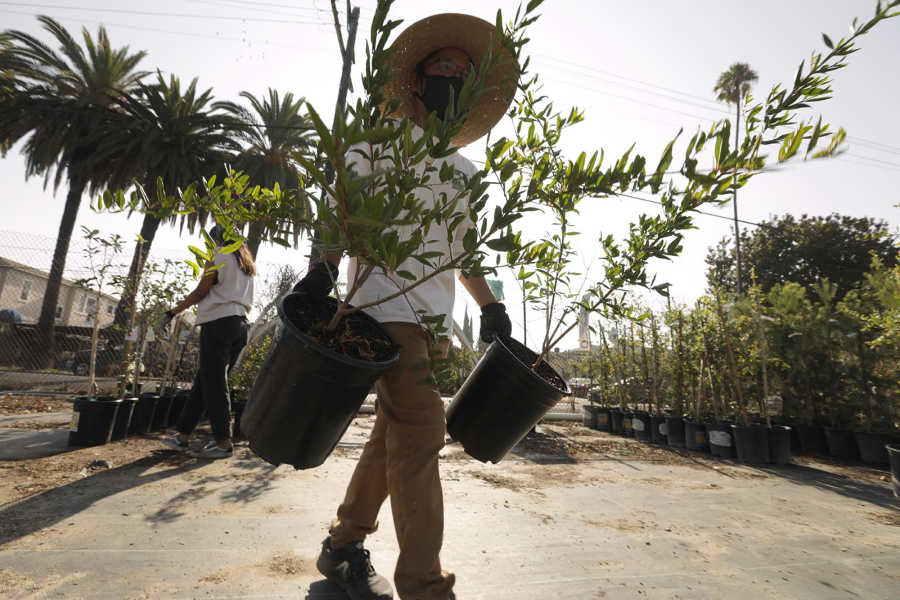California is among the states that will share in more than $1 billion in federal funding to help plant trees in an effort to mitigate extreme heat and combat climate change, officials announced last week.
The Golden State will receive about $103 million in grants from the U.S. Department of Agriculture’s Forest Service, which will go toward 43 grant recipients across Los Angeles, San Francisco, San Diego and other California communities for tree planting and maintenance, urban canopy improvements and other green efforts.
The funding comes from President Joe Biden’s landmark Inflation Reduction Act and marks the act’s largest investment to date in urban and community forests, officials said. In all, 385 grant proposals in all 50 states were selected to receive funds, according to Agriculture Secretary Tom Vilsack.
“Unfortunately, the difficulties and challenges we’ve seen with weather are not going to go away,” Vilsack told reporters recently. “We’re going to continue to be challenged by Mother Nature, so we want to make sure that our communities are more resilient and more capable of withstanding what Mother Nature may have in store.”
The investment comes as the planet continues to swelter under record-breaking heat. June, July and August all set monthly temperature records, while the three-month period as a whole was deemed Earth’s warmest on record.
Research has found that areas with more pavement and fewer trees can be 10 degrees warmer because of the so-called “urban heat island effect.” But even as experts warn that extreme heat is among the deadliest effects of climate change — killing more people each year than hurricanes, tornadoes and other weather hazards — poor neighborhoods and communities of color continue to bear the brunt of its effects.
That includes Los Angeles County, where tree canopy and extreme heat are unevenly distributed in such areas, including the eastern and southern parts of the county as well as the San Fernando Valley, a 2021 Los Angeles Times investigation found.
“If we’re going to have an impact on the landscape, we need to be planting trees in the most vulnerable areas,” said Marcos Trinidad, senior director of forestry with TreePeople, an environmental advocacy group in Los Angeles.
TreePeople is among the federal grant recipients and will receive $8 million for tree planting and maintenance, community engagement and workforce development in Southern California.
“What we proposed was to be able to plant trees where they’re needed the most, and that was from the northeast Valley all the way to the Inland Empire,” Trinidad said. “So we’ve expanded our reach, just in being able to identify the areas that need trees the most, but also the communities that are suffering the impacts — not just from global warming, but everything that goes into creating a healthy community.”
The largest amount awarded in California was $12 million to the San Francisco Public Works Bureau of Urban Forestry, which seeks to plant and establish “thousands of street trees in low-canopy communities,” according to its project description. The city of San Diego will receive $10 million to conduct community outreach, plant and preserve trees and promote tree equity, among other goals.
“This grant funding will help more cities and towns plant and maintain trees, which in turn will filter out pollution, reduce energy consumption, lower temperatures and provide more Californians access to green spaces in their communities,” read a statement from U.S. Sen. Dianne Feinstein (D-Calif.) about the program.
Other grantees include Cal State Northridge, which will put $5 million toward tree planting in disadvantaged Los Angeles neighborhoods. The university will also collaborate with Indigenous organizations to establish community-based tribal nurseries and plant culturally significant native trees, according to its project description.
Los Angeles will also benefit from an $8-million grant for L.A. County Public Works to “address the urban tree canopy deficit within disadvantaged communities in unincorporated L.A. County,” and a $5-million grant to the Los Angeles Housing Authority to conduct a tree inventory, establish an urban food forest and mitigate the urban heat island effect as part of its Greening Watts program.
The city’s Bureau of Sanitation will receive $3 million to plant 2,500 street trees, create 2,300 new tree wells and provide tree watering during the tree establishment period, according to its project description.
Trinidad, of TreePeople, said the billion-dollar investment from the federal government speaks to a much-needed shift in “how we plan around our urban forest and how we look at that as infrastructure.” The funding comes at a crucial time when millions of trees are being lost to drought, wildfires, human development and lack of tree care, he said.
However, Los Angeles has a lackluster track record when it comes to planting and maintaining trees, and came under scrutiny earlier this year for a city proposal to remove more than 12,000 mature trees as part of a sidewalk revamp project. A Los Angeles County Superior Court judge blocked the plan after outcry from tree advocates.
Trinidad said that urban forestry is often among the first sectors to be affected by budget cuts and other challenges in cities, and that it can be an “uphill battle” for resources and other needs.
But he was optimistic that L.A. will meet its goals, and noted that planting trees can help provide jobs in addition to benefits such as shade, oxygen and heat relief. Putting trees in the right location, selecting drought-tolerant trees and ensuring ongoing tree care will also make a difference.
“There’s always room for improvement,” he said. “I feel that we need to prioritize urban forestry through a different lens — one that is of larger importance — and then we can start looking at this as if it is going to save our lives one day.”
The Forest Service received 842 applications requesting a total of $6.4 billion in funding, the agency said — “an indication of the urgent nationwide need to plant and maintain more urban trees.”



